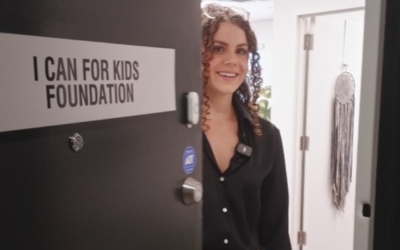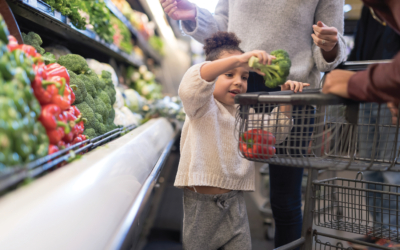I Can for Kids (iCAN) receives questions from stakeholders who ask if our grocery gift card program can effectively support all food-insecure populations. While our research highlights the positive impacts of our approach on the specific populations we serve, we recognize that grocery gift cards may not be the most appropriate form of support for all food-insecure households. In fact, we promote effective income policies as the best way to prevent and eliminate food insecurity in general.
However, some food-insecure households deal with a whole host of diverse and complex life struggles that require unique forms of assistance. This is exactly why we have established a process to target our program to the families who will benefit most from our particular type of support. As part of the formal agreement with each of our agency partners, we highlight the types of households who face the highest risk of food insecurity based on current evidence, such as low-income families, single mothers, Indigenous peoples, visible minorities, and individuals living with a physical disability.
iCAN aims to provide enough basic guidance to support frontline staff as they identify the food-insecure families who are most in need of grocery gift cards at any given moment in time. However, we also trust their expertise to target our program through the relationships and ongoing interactions that they sustain with the vulnerable families they support. As a result, our longstanding collaboration with agency partners leads to a variety of advantages, such as:
- eliminating the need to implement an invasive and undignified eligibility process that requires recipients to continually ‘prove’ their need for support through responses to highly personal questions
- ensuring the equitable allocation of support based on the severity of food insecurity that each household currently experiences
- increasing the likelihood that vulnerable households will also seek other important forms of assistance, such as access to mental health services, guidance with job seeking, and resources related to taxes and financial benefits
- assuring our donors that we invest and target their generous contributions with the highest level of accountability and efficacy that we can achieve
iCAN also recognizes that there are specific groups who may not benefit from a grocery gift card approach unless they receive more intensive support to address broader life struggles beyond food insecurity. These populations generally live with conditions or symptoms that limit or impair their capacity to make informed decisions that improve their wellbeing. These groups include, but are not limited to, individuals who:
- struggle with conditions that lead to a significant level of neurological, intellectual, or cognitive limitation
- face a high risk of engaging in an addictive or compulsive behaviour that could motivate them to sell grocery gift cards for money
- experience significant impairment from disruptive mental health symptoms, such as psychosis, paranoia, hypomania, confusion, disassociation, or binge eating
Many stakeholders reach out to ask if our approach can effectively support individuals who struggle with homelessness. Many of our recipients face housing instability or homelessness, yet they still benefit from the opportunity to use grocery gift cards. They find it much easier to maintain a consistent eating pattern with a gift card compared to a food hamper because they have full control over the types and amounts of food that they buy during each shopping trip. However, iCAN also acknowledges that the stressful experience of homelessness can lead to a greater risk of experiencing serious mental health symptoms or addictions. Our agency partners provide support to address these struggles and barriers before providing grocery gift cards.
Other stakeholders have asked whether grocery gift cards can effectively meet emergency food needs during a state of disaster, such as a flood, mass evacuation, earthquake, or fire. If the victims of these events are still able to access a grocery store during their displacement or relocation, the likelihood is extremely high that they would prefer to receive a grocery gift card rather than a food hamper. A gift card enables them to buy and transport the types and amounts of food that they need at any given time based on their evolving access to lodging, refrigeration, and cooking equipment. It is also more efficient and expedient to implement the grocery gift card model compared to gathering, transporting, assembling, and delivering food hampers to meet urgent needs during an incredibly disorienting and stressful time.
Lastly, iCAN also fields questions about the potential for a community organization to operate a grocery gift card program in rural areas. This is certainly a viable option, and we are open to collaboration with other charities or stakeholders who wish to explore this concept. It’s important to note that rural opportunities will vary greatly based on multiple factors, including:
- the distance to the nearest major grocery store
- access to transportation to travel to a grocery store
- whether grocery stores in the area offer a gift card option
- the capacity to engage local social service agencies to target the program
We are highly committed to collaborate with other agencies across the charitable sector who share our mission to alleviate food insecurity among low-income and equity-seeking populations.
To learn more about iCAN visit www.icanforkids.ca.
For more information and media inquiries contact iCAN Executive Director Bobbi Turko at bobbi@icanforkids.ca.
About Donald Barker
Donald Barker has worked as a registered dietitian for more than 25 years. He also has a professional background in communications and has long advocated for populations who face adverse, unjust, or systemic barriers that lead to higher rates of poor social, mental, emotional, and physical health outcomes. Donald currently volunteers as an Advisor with iCAN to support our transition towards evidence-based approaches that help improve the well-being of children in Calgary who live in low-income and food-insecure households.
About I Can for Kids Foundation
I Can for Kids works closely with multiple agency partners to target and distribute grocery gift cards to food-insecure families who are most in need. The iCAN grocery gift card program is a more dignified and inclusive approach to dealing with food insecurity, allowing families to shop where everyone else shops and to choose foods that are appropriate for their health and cultural needs. Explore their website to discover more about iCAN’s impact over the years.
For more information and media inquiries, please contact iCAN Executive Director, Bobbi Turko at bobbi@icanforkids.ca.




